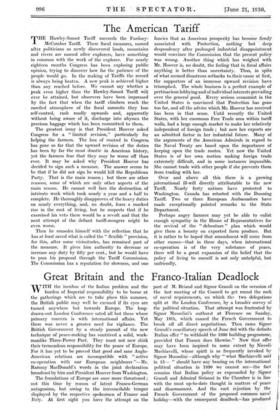The American Tariff
THE Hawley-Smoot Tariff succeeds the Fordney- McCumber Tariff. These fiscal measures, named after politicians as newly discovered lands, mountains and rivers are named after explorers, have something in common with the. work of the explorer. For nearly eighteen months Congress has been exploring public opinion, trying to discover how far the patience of the people would go. In the making of Tariffs the record is always being beaten. A new peak is achieved higher than any reached before. We cannot say whether a peak even higher than the Hawley-Smoot Tariff will ever be attained, but observers have been impressed by the fact that when the tariff climbers reach the rarefied atmosphere of the fiscal summits they lose self-control, rush madly upwards and, apparently without being aware of it, discharge into abysses the precious baggage which has been committed to them.
The greatest irony is that President Hoover asked Congress for a " limited revision," particularly for helping the farmers. The loss of control in Congress has gone so far that the upward revision of the duties has been by far the most drastic in American history, yet the farmers fear that they may be worse off than ever. It may be asked why President Hoover has decided to sign such a measure. The answer seems to be that if he did not sign he would kill the Republican Party. That is the main reason ; but there are other reasons, some of which are only other aspects of the main reason. He cannot well face the destruction of intricate work which took nearly a year and a half to complete. He thoroughly disapproves.of the heavy duties on nearly everything, and, no doubt, fears a marked rise in the cost of living, but he suspects that if he exercised his veto there would be a revolt and that the next attempt of the defiant tariff-mongers might be _even worse.
Then he consoles himself with the reflection that he has at least saved what is called the " flexible " provision, for this, after some vicissitudes, has remained part of the measure. It gives him authority to decrease or increase any duty by fifty per cent., but he would have to pass his proposal through the Tariff Commission. The Commission has a reputation for slowness, and one fancies that as American prosperity has become firmly associated with "Protection, nothing bit deep despondency after prolonged industrial 'disappointment would convince the Commission that the present policy was wrong. Another thing which has weighed with Mr. Hoover is, no doubt, .the feelhig that in fiscal affairs anything is better than uncertainty. Thus, in 'spite of what seemed disastrous setbacks to their cause at first, the supporters of an immense hpward revision have triumphed. The whole business is a perfect example of pertinacious lobbying and of individual interests prevailing over the general good. Every serious economist in the United States is convinced that Protection has gone too far, and all the advice which Mr. Hoover has received has been in that sense. Until recently the United States, with her enormous Free Trade area within tariff walls, had a large enough market to make her relatively independent of foreign trade ; init now her exports are an admitted factor in her industrial future. Many of the arguments of the American Admirals in regard to the Naval Treaty are based upon the importance of keeping open the trade routes. Yet now the United States is of her own motion making foreign trade extremely difficult, and in some instances imposSible. She cannot trade with other people if she prevents them from trading with her.
Over and above all this there is a growing international ill-will directly attributable to the new Tariff. Nearly forty nations have protested to Washington. Canada has retorted with the Dunning Tariff. Two or three European Ambassadors have made exceptionally pointed remarks to the State Department.
Perhaps angry farmers may yet be able to enlist enough sympathy in the House of Representatives for the revival of the " debenture " plan which would give them a bounty on exported farm produce. But it is rather to be hoped that amendment will come from other causes—that in these days, when international co-operation is of the very, substance of peace, there will be a great expansion of the belief that the policy of living to oneself is not only unhelpful, but unfriendly,








































 Previous page
Previous page